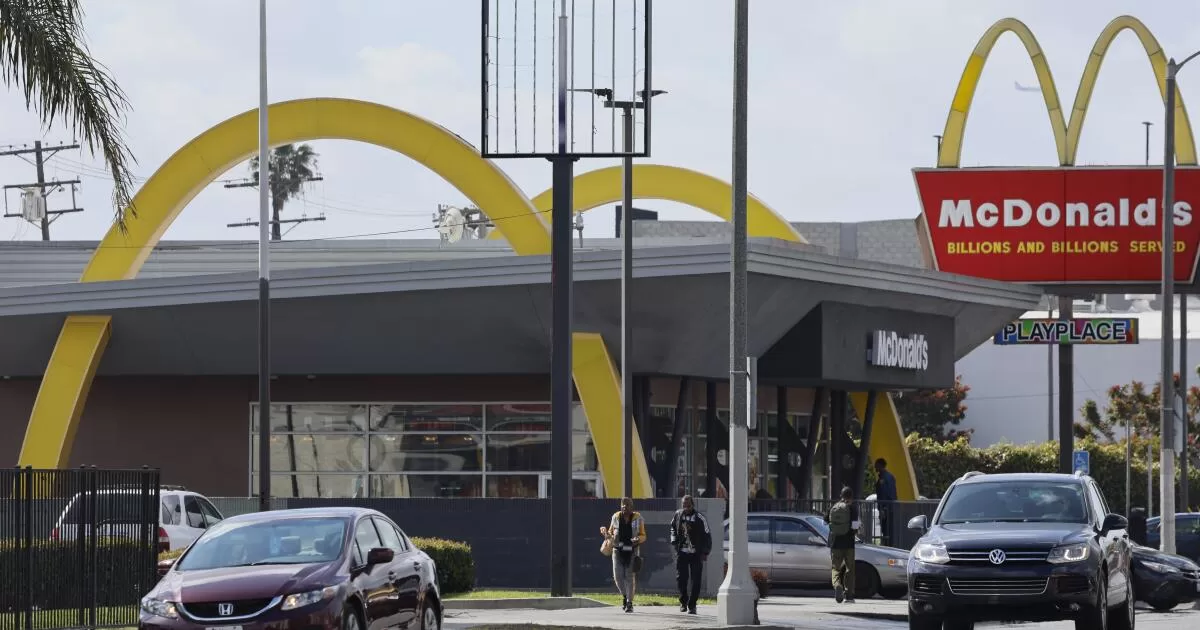Now, fast food is likely to join that list, as a $20 minimum wage mandate kicks in this week for workers at big chain restaurants including Jack in the Box, McDonald’s, Chipotle, Starbucks and many others.
The new sector-specific minimum wage could help pull half a million California fast-food workers out of poverty, but could also add one more cost concern for lower-income residents, as some business owners have already said that they are hiking prices in order to cover the mandate.
“If it’s for 50 cents, I would still come,” Ashley Ollarsaba, a Los Angeles mother of five said of potential price increases as she ate an ice cream cone at a McDonald’s in Carthay Square on Monday. “If it’s for a few dollars more, I don’t know.”
The fast-food wage law kicks in as state lawmakers debate how to drive down Californians’ notoriously high electricity bills and grapple with an insurance crisis that is raising costs for many homeowners.
Taken together, the issues highlight a challenge the state faces in achieving Democrats’ progressive policy goals such as curbing climate change and improving conditions for low-wage workers: Someone has to pay for them — and that often falls to the consumer.
“What everybody is struggling with is the difference between what they ideally want and then what some of it means to the pocketbook. It’s a dilemma,” said Mark Baldassare, statewide survey director for the Public Policy Institute of California, a nonpartisan research firm.
“We know the polling shows that people want better wages,” he said. “But on the other hand, we know that not everybody’s in a position to feel comfortable with what that might mean to them when they look at their credit card bill.”
Baldassare said policy decisions by Democrats who control the state Capitol may be getting more scrutiny now because Californians are “very nervous” about their finances.
Even as economists reiterate that pandemic-fueled inflation is calming down, voters are still very much frustrated with costs. Those nationwide worries feel amplified in California, where residents have been paying out more than most other Americans since long before new cost hikes.
Economic concerns were top of mind for Californians when the Public Policy Institute polled adult residents in February. One in five Californians said the most important category of issues for Democratic Gov. Gavin Newsom and the Legislature to work on in 2024 was jobs, the economy and inflation.
Supporters of the fast-food wage requirement, including the state’s powerful worker unions, rushed to assure customers this week that any price increases they saw were the choice of wealthy companies and not required by the new law.
The Service Employees International Union, which pushed for the fast-food wage hike, points to research that shows wage increases are actually good for businesses and stimulate the economy.
“With a 10-cent increase on a burger, consumers will say, ‘Oh geeze, $5.10 instead of $5.’ But they’re not going to change their behavior,” Michael Reich, an economics professor and chair of the Center on Wage and Employment Dynamics at UC Berkeley, said at a news conference organized with SEIU.
It’s still largely unclear how much prices will increase across restaurants, but Republicans have seized on the cost panic to portray themselves as more sympathetic to the concerns of everyday Californians in a state where the party lacks enough power to shape policy.
“It’s already too difficult for families to be able to afford this state,” said state Sen. Rosilicie Ochoa Bogh (R-Yucaipa), who opposed the fast-food minimum wage bill. “What we need to be doing is working to lower living costs and increase opportunities for growth, not the other way around.”
Republicans and some Democrats found a rare common cause when they objected to a recent proposal to raise electricity rates, a signal that cost concerns are cutting across party lines.
Some Democrats in the Legislature reneged on their earlier support for an income-based plan for calculating how much people are charged for electricity, after hearing from outraged middle-class constituents tired of skyrocketing power bills who fell under new cost hikes. The fallout did not prove worth it for those Democrats; they wound up siding with their cost-concerned constituents over some environmental activists who wanted to charge some residents more for electricity as part of a complex proposal meant to fund upgrades to prevent wildfires and transition to clean energy.
“There’s been a conscious effort from the beginning to try to make sure that there aren’t real price shocks. … and to try to soften that blow,” said Ethan Elkind, director of the climate program at Berkeley Law’s Center for Law, Energy and the Environment. “You have to go basically as fast as the public can accept it.”
As California Democrats find themselves in the unusual position of playing defense while they continue to push for liberal ideals, they argue that some of their policies are in response to the state’s affordability crises — not worsening it.
State Sen. María Elena Durazo (D-Los Angeles), who wrote the law creating a minimum wage for healthcare workers that is also in the throes of cost debates, said she won’t let detractors muddy Democrats’ fight for a “living wage” in a state that’s home to some of the most expensive cities in the world.
And the large fast-food chains can afford it, she said.
“This in fact is a solution in reaction to the fact that everything is going up in cost,” Durazo said, noting that food costs had increased before the wage standard kicked in. “It’s not the workers getting a better wage that’s the problem.”
Ollarsaba, the mom of five who stopped for lunch at McDonald’s this week, said that she supports the new law raising workers’ wages even if it means small price increases are on the horizon. She said she empathizes with workers serving up burgers and fries for minimum wage: “I think they work really hard for it.”
